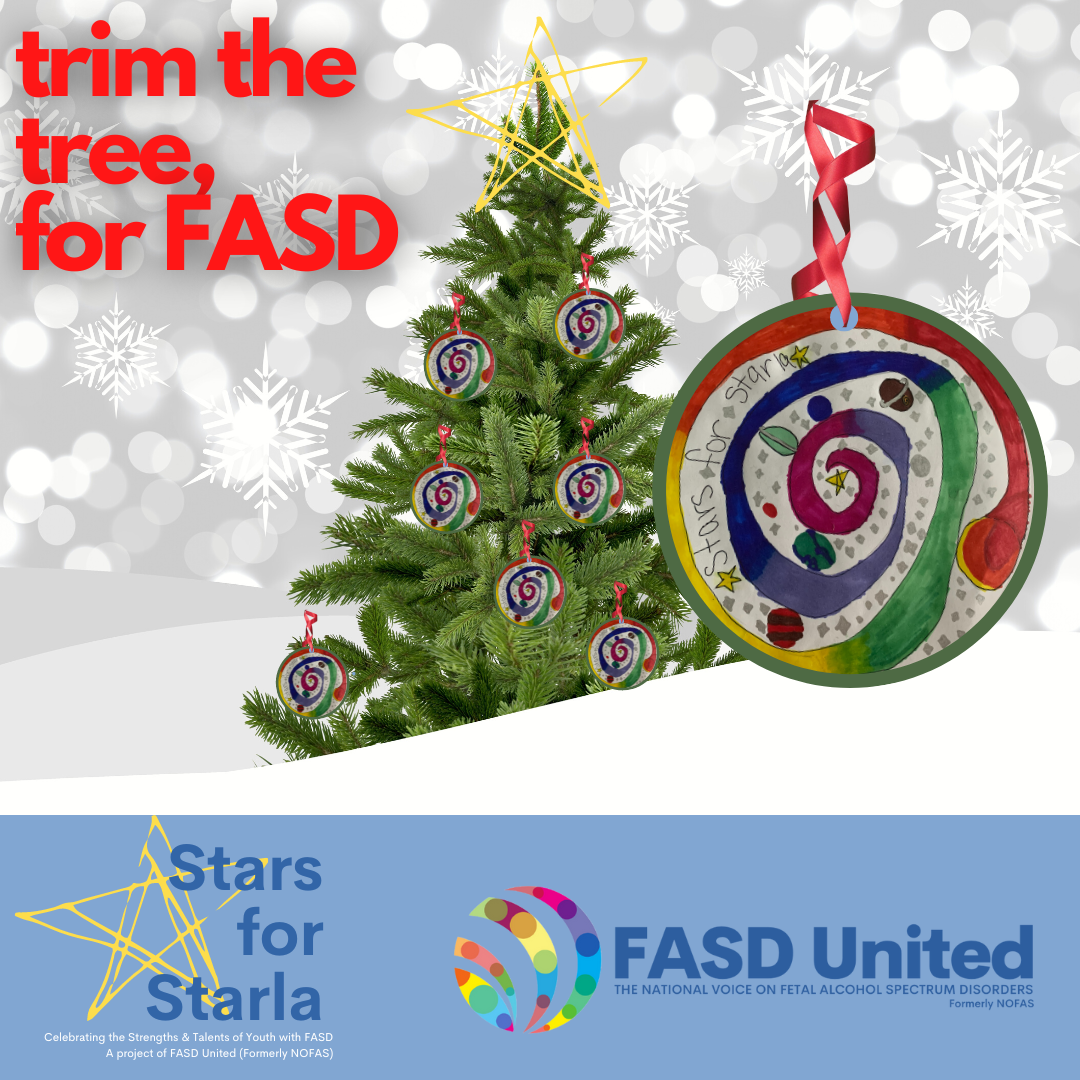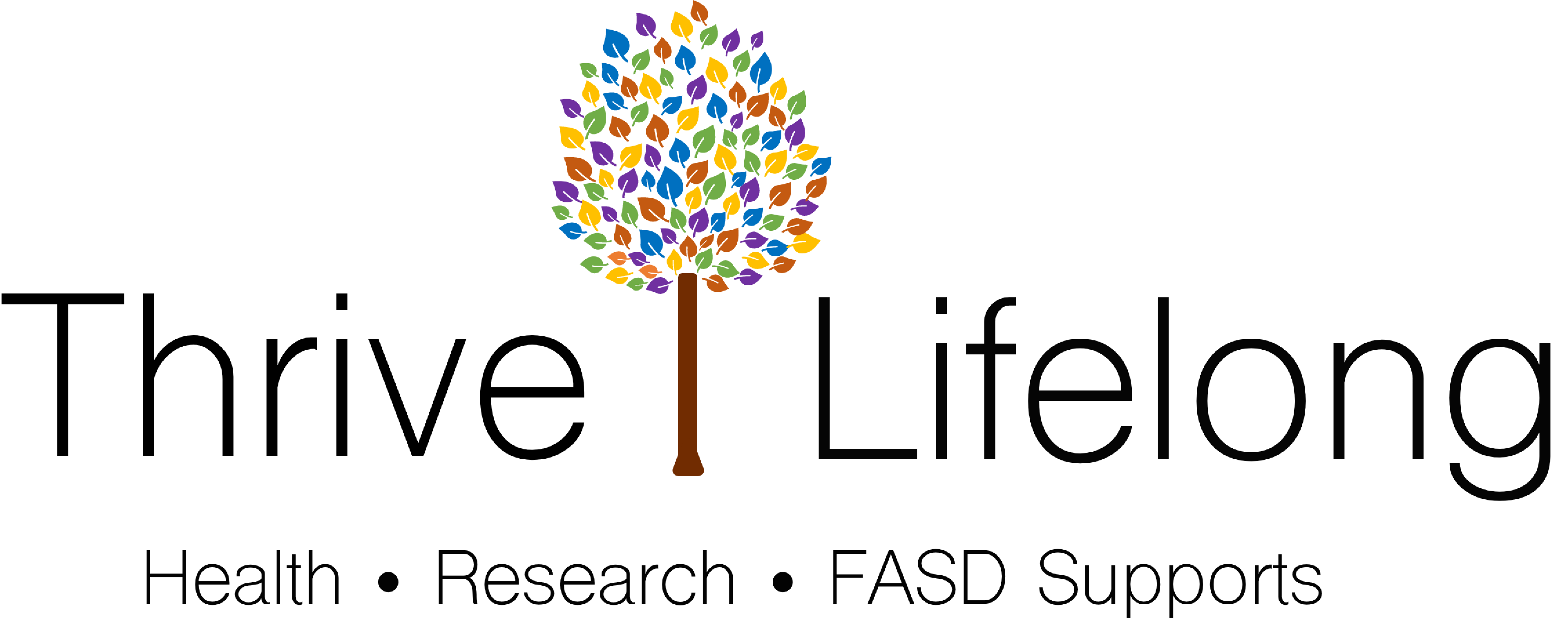Newsletter - December 2022
Order Your Star for Starla Ornament Today!

Thank you to anyone who sent in a design for the Stars for Starla contest! The 2022 ornament design is packed full of fun, colors, and would look great as a holiday ornament in your home this season!
The next step of the Adult App project is here, which involves an online surveys for adults with FASD to provide feedback on initial design prototypes. Adults with FASD around the world can participate as long as they are 18+ and have sufficient enough English proficiency to complete the survey.
The ornament is made of 3-inch ceramic and was designed by a youth with FASD. It is a perfect gift for friends, family, therapists, teachers, or just as a way to spread FASD awareness to those around you. The proceeds of the ornament go to continue the national awareness and fundraising campaign by FASD United (formerly NOFAS) and the Stars for Starla Youth Recognition Awards.
Ornaments are starting to be shipped out to families on November 22, 2022 through the United States Postal Service. The form to order your 2022 Stars for Starla Ornament can be found on the FASD United website here: https://fasdunited.org/product/2022-stars-for-starla-ornament/.
You can also order a Stars for Starla Youth Recognition Certificate for an individual with FASD to let them know that their achievements are seen! The link to order yours today can be found here: https://nofaspolicycenter.org/stars-for-starla-awards/.
Focus Groups for Provider App

Are you a mental health provider who works with families? You may qualify for this study!
Do you know a mental health provider who might be interested? Tell them about this opportunity to help advance the care for children with fetal alcohol spectrum disorders (FASD).
This is an opportunity to participate in a focus group to provide feedback on an app we are developing for providers to use with families. Providers receive $25 for participating.
We are looking to include mental health providers and trainees with and without experience with FASD. This study will help us develop an app and training materials for mental health providers to better identify and serve children with FASD. The app will provide resources, tools, and information on how to help families.
To learn more and sign up: https://bit.ly/Providerapp.
Questions?
Email: fmfconnect@urmc.rochester.edu
Call: (585) 275-2991 x 334
You are also welcome to pass along information about this study to colleagues and networks through email and social media. Thanks for your support!!!
Research Corner

Exploring the Contributions and Suitability of Relational and Community-Centered Fetal Alcohol Spectrum Disorder (FASD) Prevention Work in First Nation Communities
Pei, Carlson, Tremblay, & Poth.
Prevention programs for women are effective to decrease future alcohol use during pregnancy. However, little is known about the effectiveness and suitability of such programs for women in rural areas. Therefore, researchers at the University of Alberta collected data from service providers in rural and isolated First Nation communities in Alberta, Canada.
The 35 participants in the study were mentors of existing Parent- Child Assistance Program (PCAP) in Alberta. Currently, there are 30 PCPA sites in Alberta. This program is an evidence-based, trauma-informed, and community-based prevention program that help women to reduce alcohol use before and during pregnancy. Currently, there are 30 PCPA sites in Alberta. Among the participants, 29 finished a semi-structured interview, 6 participated in a focus group. They answered questions about the PCAP process, program success and challenges. The researchers also used participants’ quarterly and/or annual reports for more detailed information on the implementation of the program.
The data analysis revealed 6 themes: (1) Preparation was important. PCAP mentors needed to have community knowledge, get community approval, and spend time and effort to build relationships; (2) Mentors should use a trauma-informed, client-centered approach, and facilitate community collaboration; (3) Mentors identified their clients’ achievement on well-being improvement, family functioning enhancement, and community FASD awareness improvement; (4) There were challenges including limited access to resources and clients’ complex needs; (5) Mentors often needed to adapt to the culture and other contexts of First Nations communities; (6) Moving forward, mentors recommended to have a new funding model, to improve data collection, and to facilitate collaboration with other organizations.
These findings showed that prevention programs like PCAP have positive impact within First Nations communities. It’s important for service providers to adapt to the local culture and collaborate with other local organizations.
Holiday Tips for Children with FASD or PAE

The holiday season is a fun time of the year! However, it could also be stressful for children with special needs. Here are some tips for parents and families to help reduce the stress.
-
Talk to family and friends!
Talk to friends and family in advance. Discuss what might help your child feel most comfortable at family events. -
Ask for support.
Ask families and friends for help and support when you are not around your kid. We all need a little help once in a while! -
Keep a schedule.
Try to keep a regular schedule of bedtime and mealtime. This will decrease stress for your child and may avoid meltdowns. -
Set up a safe space for your child.
Have a “safe” spot at home where your child can go when they feel overwhelmed. You can schedule times to “chill out” with your child and allow them to decompress in this safe space. -
Make the task easier.
Some children struggle with fine motor skills, and this can make things like crafts and opening presents difficult; consider simplifying the craft or making the present easy to open (like making a spot to tear) to avoid frustration. -
Wrap up something familiar.
Some kids get stressed out unwrapping toys that aren’t familiar to them. Try wrapping up one or two of their favorite toys! Unwrapping something they know and like can be a very reassuring feeling for some kids. -
Take it down a notch.
Some kids get overwhelmed easily with the hustle and bustle of the holidays. Try to do smaller and simpler shopping trips. -
New foods can be a challenge.
Some holiday parties might have food your child isn’t used to. Consider introducing these foods slowly by having your child smell the food first, take time for your child to get used to the new food. Maybe consider having a “no thank you bite” where you tell your child to try the new food, but if they don’t like it, they can say “no thank you” and not have to eat the rest. This can help your child feel in control and decrease stress. Remember that kids with sensory sensitivity find some foods hard to eat! -
Prepare for the picky eater.
If you know your kid won’t eat the traditional holiday foods at a party, try bringing a food you know your child will eat. This will be less stress for you and your child! -
Pictures can help!
Some kids can get overwhelmed very easily going to a new place or seeing people they don’t normally see. Try sitting down with your child a once a day in the days leading up to the holiday festivities and show them pictures of what they will be doing. Seeing a visual representation of the people, place, and events they will be doing can make preparation a bit more concrete for your child and helps them not get so overwhelmed with a new experience. -
Create an alternate experience.
The holidays can be stressful for parents because there is the potential for a dysregulated child and having to conform to the standards of a social event. Instead of going out, consider another holiday celebration like staying at home, baking cookies, watching a movie, and doing crafts. -
Seek out sensory friendly places.
If you are a family that likes to take pictures with Santa or go out to do the holiday activities, check your community or look up “Sensory-friendly Santa” or other sensory friendly spaces in your community. It can be a way to get out without the sensory overload many children get this time of year. -
Take time for yourself!
Remember that this is your holiday season too! Take time for yourself and schedule in some self-care while your child is being watched by a partner, child-care personnel, family member, or friend. Taking this time will make the holiday season better for you and your child!
FASD United Upcoming Events

FASD United has some upcoming virtual events happening this month.
Weekly Policy Drop-In on the 7th, 14th, and 21st to get updates on the FASD Respect Act, ask questions, and get tips on how to advocate for the policy.
There is also the Monthly Policy Forum on the 28th that is open to all advocates and covers a wide range of topics aimed to brief advocates and guide people on policy outreach. Click this link to see the FASD United Event Schedule: https://nofaspolicycenter.org/events/.

